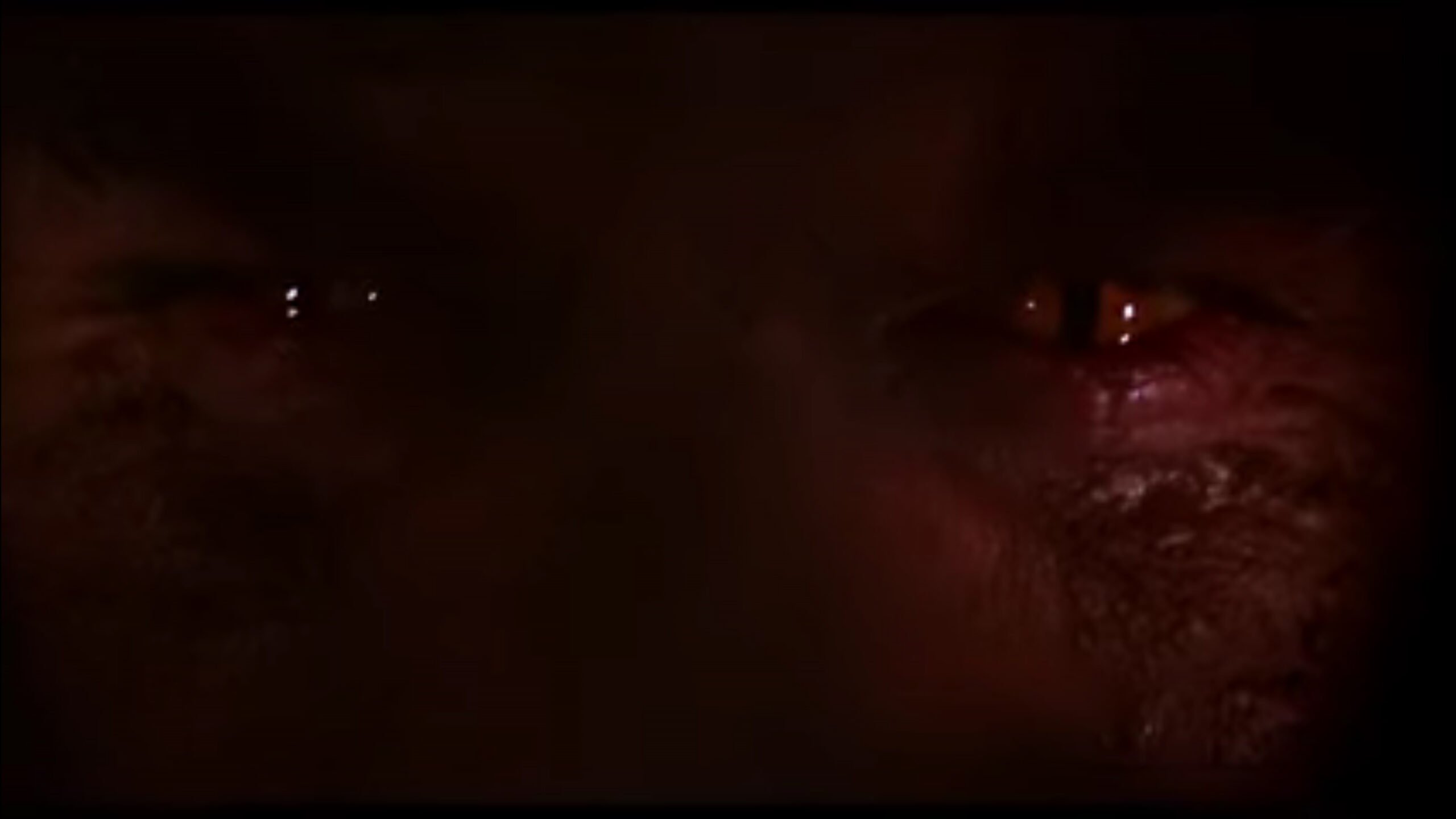Rosemary’s Baby: Another Movie Sponsored by Intel
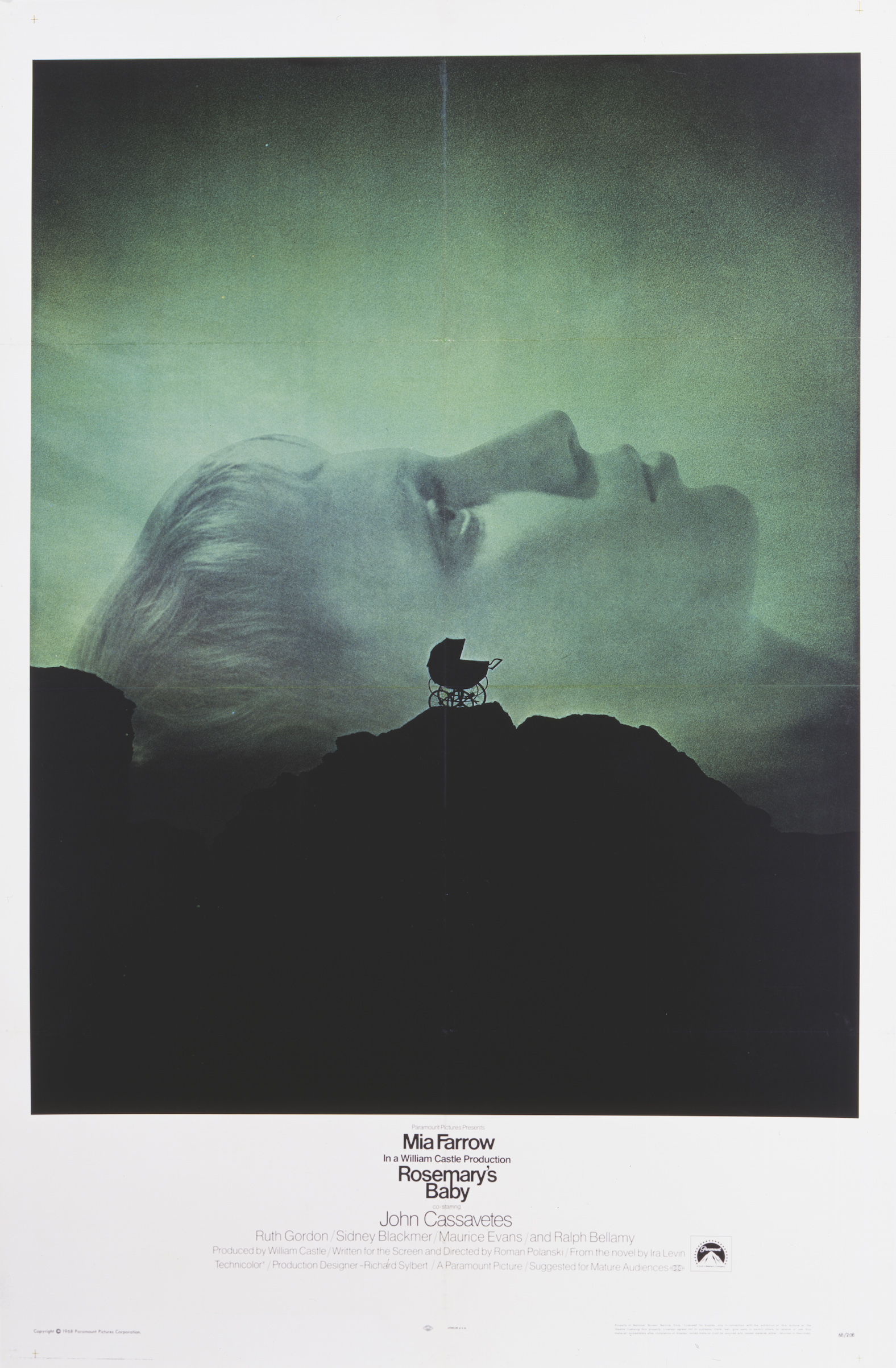
THE SONS of Cain are obsessed with telling their own story. Their biological and bastardy origins are tirelessly regurgitated over and over and over again from the Hollywood sound stage. The slaves whom they rule over lap it up. Never is that more obvious than with Rosemary’s Baby. Hell, it might as well be Satan’s own auto-biography. If you haven’t the faintest clue what I’m speaking about, then I suggest you read my paper on Serpent Seed. That’s how shockingly on par with reality Roman Polanski’s movie truly is. Legitimate horror.
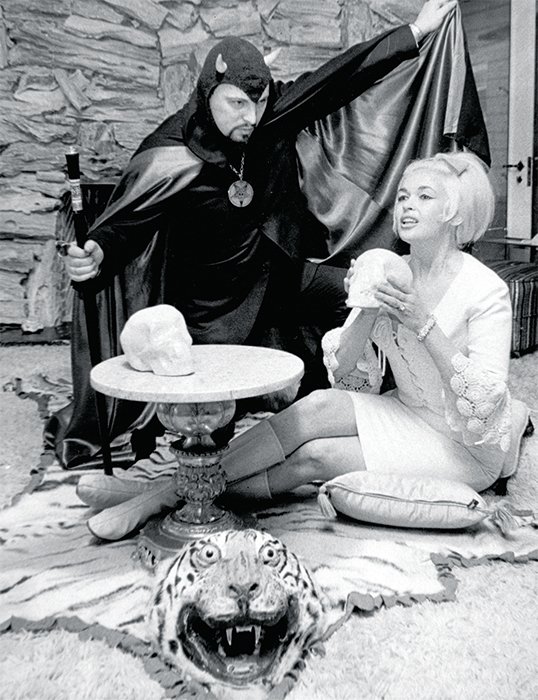 As a reminder, this was the last movie Polanski directed before the murder of his wife, Sharon Tate, but my serial reader already knows that was a hoax. The mere fact that Rosemary’s Baby so blatantly mirrors a psycho-dramatic exercise such as the Manson murders, and is regularly commented upon as such, should scream to everyone with the ferocity of a tornado siren that there is cognitive dissonance needing diagnosed. Just do me a favor and replace the word witch for spook and witch’s coven for Intel network. They’re equally the same thing. Productions. Pick either movie. Rosemary’s Baby or Sharon Tate’s baby. Both were designed to complement the other, probably from the very moment when the boys down at Langley stood around the water cooler.
As a reminder, this was the last movie Polanski directed before the murder of his wife, Sharon Tate, but my serial reader already knows that was a hoax. The mere fact that Rosemary’s Baby so blatantly mirrors a psycho-dramatic exercise such as the Manson murders, and is regularly commented upon as such, should scream to everyone with the ferocity of a tornado siren that there is cognitive dissonance needing diagnosed. Just do me a favor and replace the word witch for spook and witch’s coven for Intel network. They’re equally the same thing. Productions. Pick either movie. Rosemary’s Baby or Sharon Tate’s baby. Both were designed to complement the other, probably from the very moment when the boys down at Langley stood around the water cooler.
1966 was the big year. That was the year when Anton LaVey launched the Church of Satan in San Francisco. For 1966 spells out 666, you see. I know, ridiculous, right? Really, do us all a favor and stop quoting from Anton LaVey in order to prove your point. I am fatigued of hearing his stupid asinine quotes, and it has little to do with the fact that he’s a self-declared Satanist. Anton LaVey is nothing less than a spook. At best he’s a detour. It’s actually difficult to quantify the amount of damage the CIA-backed Church of Satan has done upon the religious mind to masquerade the true operations of evil (which they repeatedly slap in our face) with a cheap store-front mannequin display. Let’s put it this way. If leotard and Halloween is still your measuring stick for malevolence, then you probably haven’t even stuck your head into the rabbit hole.
Has anyone ever seen a picture of LaVey, dressed in his ridiculous horn cowl and cape? Other spooks probably find his wardrobe embarrassing. Even more awkward are those photos of a bare-breasted, clown-faced Susan Atkins emerging from a coffin. Could they make the Charlie Manson Intel project any more obvious? Apparently, Colonel Louis West had far too many roles to fill and not enough actors to work with. They don’t call it the actors pool for nothing.
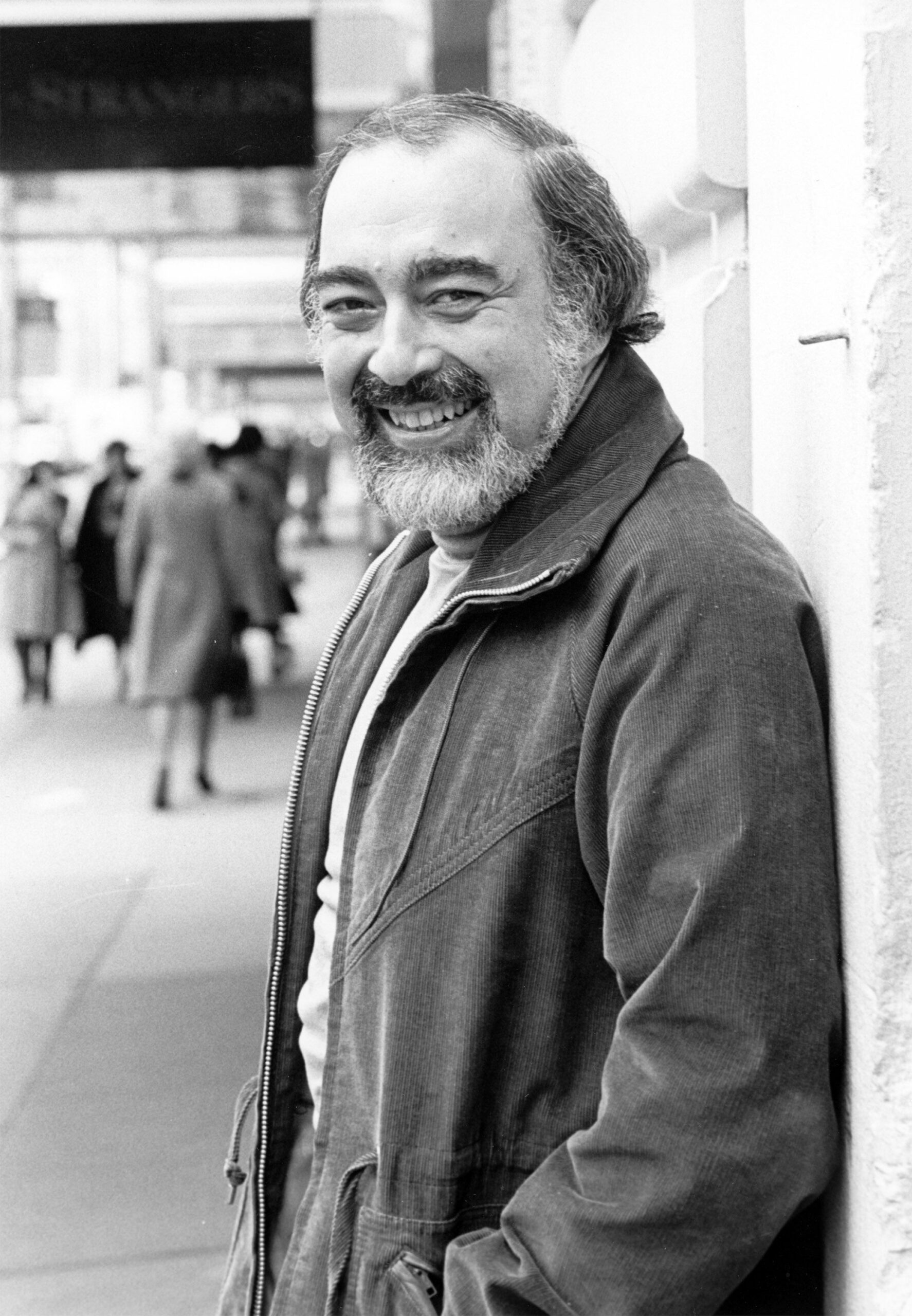 Before you tell me ‘Rosemary’s Baby’ was released in 1968, thereby debunking my crumb trail, the plot pointedly takes place in 1966. Technically, Rosemary’s Baby was based upon the horror novel by Ira Levin, and that was released in 1967. Still took place in 1966 though. They went out of their way to make the connection. The very name Rosemary reminds us of the Virgin Mary, and in both the movie and the novel, the mother of Satan’s child has a due date of June. 06-1966. How adorable. She then sits in the doctor’s office reading from the April 8, 1966 edition of TIME Magazine, with a cover that dares ask: Is God Dead? Just goes to show that TIME, like its counterpart LIFE Magazine, is run by the same people.
Before you tell me ‘Rosemary’s Baby’ was released in 1968, thereby debunking my crumb trail, the plot pointedly takes place in 1966. Technically, Rosemary’s Baby was based upon the horror novel by Ira Levin, and that was released in 1967. Still took place in 1966 though. They went out of their way to make the connection. The very name Rosemary reminds us of the Virgin Mary, and in both the movie and the novel, the mother of Satan’s child has a due date of June. 06-1966. How adorable. She then sits in the doctor’s office reading from the April 8, 1966 edition of TIME Magazine, with a cover that dares ask: Is God Dead? Just goes to show that TIME, like its counterpart LIFE Magazine, is run by the same people.
Another popular novel of Levin’s is The Stepford Wives, a plot which reminds us how the boys club is systematically replacing members of society with cloned robotic-zombies. With The Boys from Brazil, our future world dictators are non-other than Intel-bred clones with childhood dreams of speaking to large crowds. Levin was a Joo but also an “atheist.” Now you know.
 1967. That was the year when the Beatles released their eighth studio album, Sgt. Pepper’s Lonely Hearts Club Band. Aleister Crowley landed on the cover and he was pushing Satanism, but only as an Intel agent. Marilyn Monroe appeared on the cover, and she was androgynous. Satanic agenda. Shirley Temple appeared on the cover, and she was a rather obvious product of pedophilia. Again, Satanic agenda. You can read about that here. Marilyn Monroe. Shirley Temple. Paul Is Dead. Point being, 57 different faces landed on the cover, not including the Fab Four, and everyone of them were spooks.
1967. That was the year when the Beatles released their eighth studio album, Sgt. Pepper’s Lonely Hearts Club Band. Aleister Crowley landed on the cover and he was pushing Satanism, but only as an Intel agent. Marilyn Monroe appeared on the cover, and she was androgynous. Satanic agenda. Shirley Temple appeared on the cover, and she was a rather obvious product of pedophilia. Again, Satanic agenda. You can read about that here. Marilyn Monroe. Shirley Temple. Paul Is Dead. Point being, 57 different faces landed on the cover, not including the Fab Four, and everyone of them were spooks.
Another obnoxious Intel sponsored album released in 1967 was the Rolling Stones On Her Satanic Majesty’s Request. More Satanism, I guess. Is Mick Jagger wearing a dunce cap? Uh-huh, I think that’s a dunce cap. So lame. Apparently, Satanism was all the rage, but only if you were promoting it as a spook. How is any of this organic?
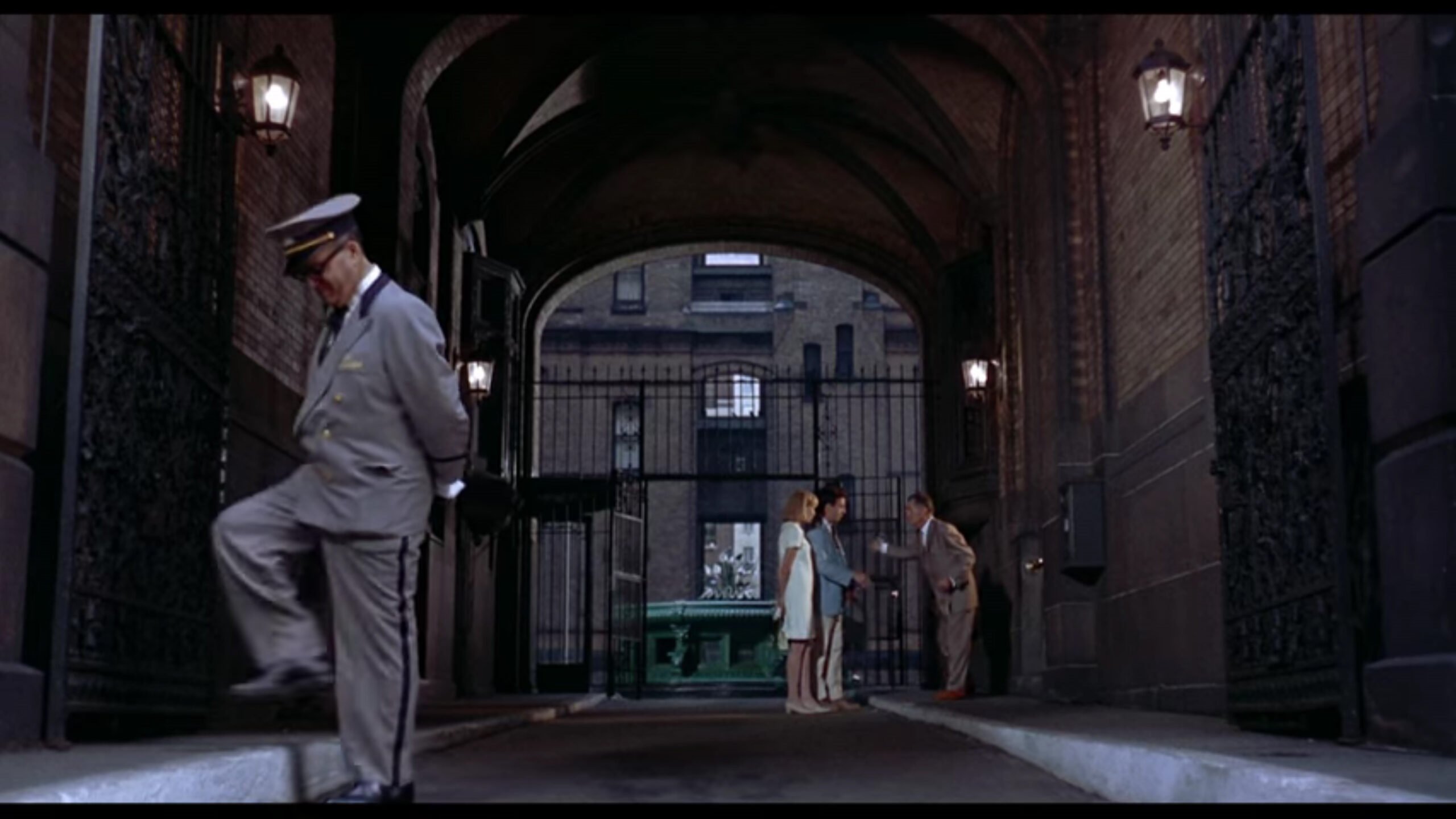
OH sure, The Sixties netted a spirit in the air, alright. It was being blown right out of a swamp cooler perched from a second-story window at the Pentagon.
Roman Polanski’s movie greets us with a childlike song, a series of “la-la-la’s” really, gently cooed by our leading lady, Mia Farrow. We are given a panorama of New York City, whereas the camera glissades over its upper west-side buildings, and we are pressed to ask if it is the spirit of The Sixties riding with the breeze, seeking its resting place in the lap of our collective consciousness. The camera, or rather the entity, drifts downwards towards the Dakota Building for our first introduction of Guy and Rosemary Woodhouse. Only here the gothic building is called the Bramford. Call it whatever you’d like, it is a mud flood structure. The official narrative gives the Dakota an origins story, but I don’t believe a word of it. Actually, we have arrived at the precise moment when the young childless couple enter the very gateway by which John Lennon would be shot in as little as 12 years. Another Intel hoax with obvious ties to this movie. Yoko Ono was a real-life Minnie Castevet in that she was a witch but also John Lennon’s handler, and Mark David Chapman was related to all the same people.
Guy and Rosemary are here to inspect an apartment up for lease, and we quickly learn that the former tenant, a certain Mrs. Gardenia—one of New York City’s first and finest female lawyers—died in a coma. Take a mental note of that. We are given a few other clues. She had a particular fondness for the growing of herbs, none of which, Guy pointedly states, included cannabis. The cabinet that she pushed in front of a linen closet is another oddity, as is the handwritten note which only Rosemary discovers and reads. It claims: “I can no longer associate myself.” Mm-hmm, Mrs. Gardenia has become the victim of an Intel project. It’s okay. You can say it. MK-Ultra.
Another observation that has already been overlooked, it is while venturing through the courtyard of the Bramford, in route to inspect the apartment, that their landlord asks if Guy is a doctor. In fact, the question is poised as the very first line of dialogue in the movie. Rosemary proudly responds that he is an actor. Their landlord then wants to know if he’s seen him in anything. Rosemary fills him in on those details. “He was in Luther and Nobody Loves an Albatross and a lot of TV commercials.” Their landlord still doesn’t recognize him, but seems inspired by the commercial aspect of his career. From this brief conversation we can deduce a couple of things. The Bramford is an apartment for the wealthy, which Guy and Rosemary are not. And secondly, that Guy is an unsuccessful actor, if we are to gauge success by fame and recognition and the money that accompanies it, which Rosemary Baby does. But he wants to be. More importantly, he plans to be.
After learning of their desire to move into the Bramford, combined with the hope of starting a family there, Rosemary’s friend Hutch attempts to warn them over dinner of its dark past involving witchcraft and murder. While cutting into their steaks, Hutch’s own sense of confidence grows as he elaborates about the dietary experiments of the Trench sisters and the parties of Keith Kennedy to no avail. Somebody named Adrian Marcato lived there too. Neither Guy nor Rosemary seem to wrap their heads around the seriousness of his claims, and so Hutch adds: “The Trench sisters were two Victorian ladies. They ate young children.” There is even talk of a baby found in the basement wrapped in newspaper.
“You really rouse my appetite,” Guy says.
“Have some more wine!” Hutch exclaims.
The couple disregard the warnings of an old conspiracy theorist, always pressed to his needless research, and promptly move in.
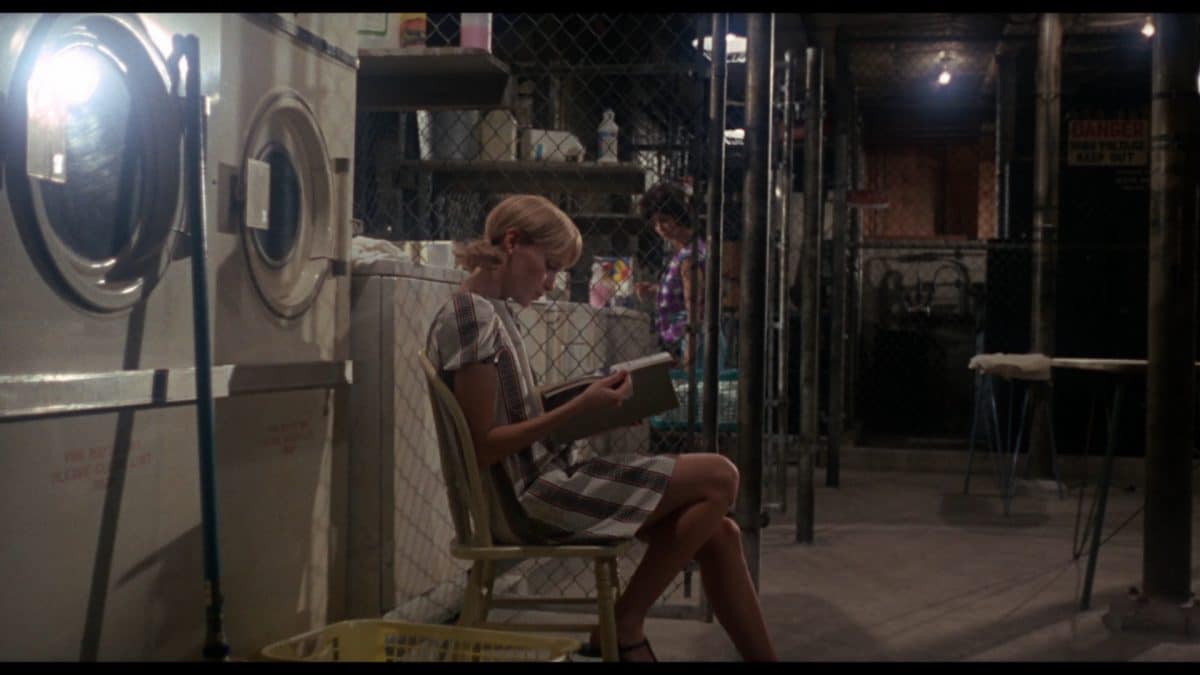
IN the basement of the Bramford, Rosemary meets Terry Gionoffrio. The two are initially occupied with their laundry (a typical scene from the big city, I suppose), but soon the childlike charms of Rosemary initiates conversation, perhaps even a blossoming friendship, after she purposely mistakes Terry for “Victoria Vetri, the actress.” Though Terry says lots of people mistake her for Victoria Vetri, Rosemary has used the flattering misidentification as a natural bridge to once again volunteer the work of her husband, telling us she is proud of his career and where it promises to take him. Despite the fact that he’s in “lots of TV,” Terry still hasn’t heard of him. See? Still not successful. All Guy needs is that big break.
Terry describes herself as a recovering drug addict whom Minnie and Roman Castevet have plucked from the sidewalk and taken in. The Castevet’s just so happen to be the Woodhouse’s neighbors. The same neighbors who Rosemary could overhear playing strange chant-like recordings from her bed. At first, Terry admits, “I thought they wanted me for sex, but they’re like real grandparents.” This tells us that sex is involved in their relationship. We also learn another clue to the death of Mrs. Gardenia, as Terry knows about her love for herbs, adding that Mrs. Castevet grows them too. And haven’t you heard? The pendant, which she proudly wears around her neck, is a gift from Mrs. Castevet.
“It’s supposed to be good luck. It’s got some stuff inside,” Terry says. Tell us more about this stuff, Terry.
Rosemary finds it beautiful, but its smell is redundant.
“I’m not mad about the smell either,” Terry admits. “I hope it works.”
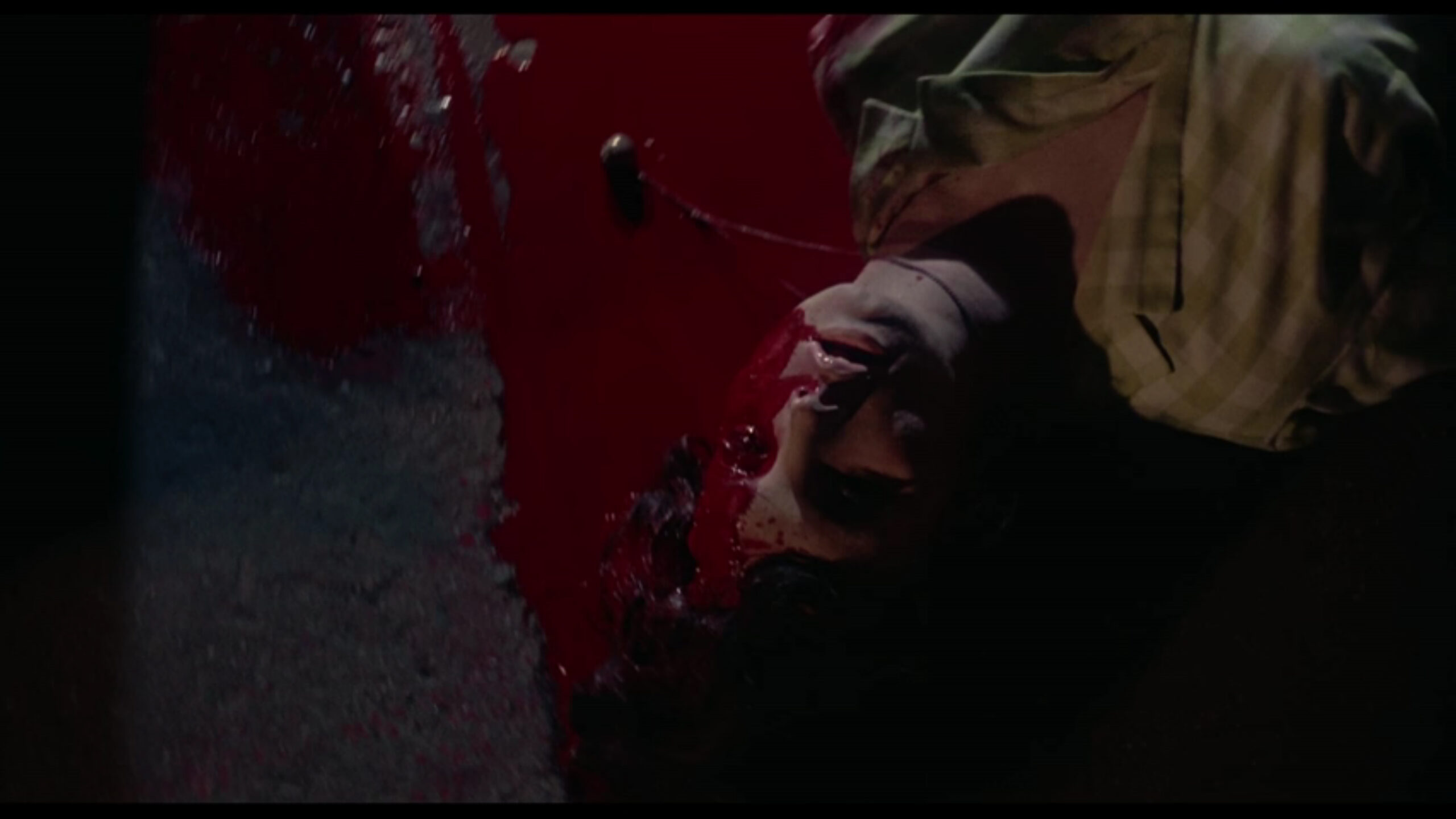
APPARENTLY, it worked too well.
When next Rosemary meets Terry, Kensington gore splatters the sidewalk. Terry has taken a leap from the window and made a bloody mess of the street. Still wearing the foul-smelling pendant around her neck though. I might as well just say it now, because some of you know it’s on my mind. Roman Polanski had a penchant for the consistently crimson qualities of theatrical blood. We will see it again during his follow-up production, Sharon’s Baby. Too soon? Moving on.
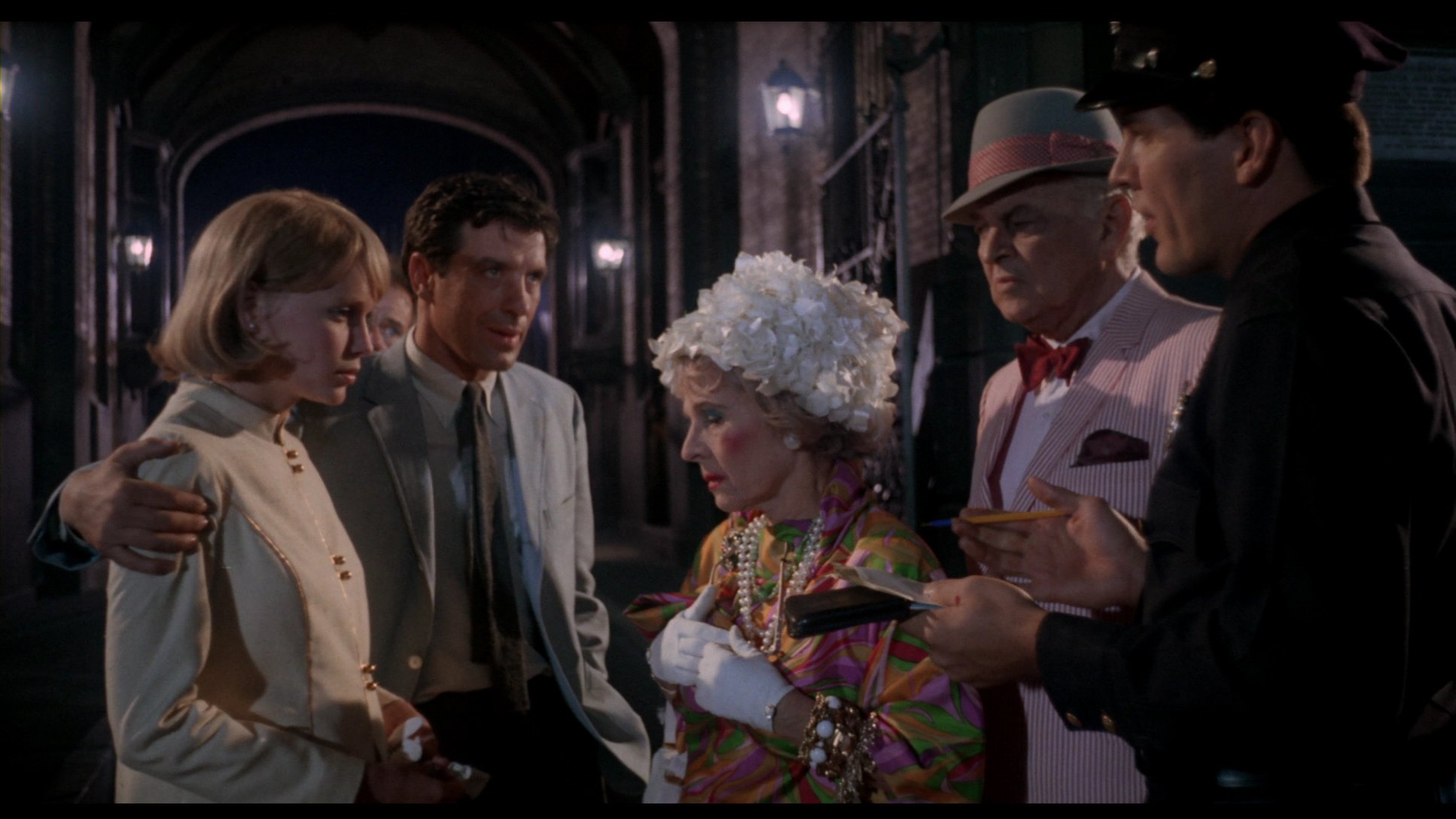
OUR first official introduction to Roman and Minnie Castevet arrives on the very sidewalk where Terry’s fate has only moments earlier been decided. The couple emerge from the lamplight, never turning up a moment too soon or late in the production, and gaze upon the tangled mess of the young woman who had stayed for a time as their house guest. The heavy-handed apathy in their sympathy doesn’t go unnoticed.
On the following day, Guy returns from an audition and announces that somebody named Donald Baumgar got the part in his stead. It was a bad part anyways, he adds. His mood is further hampered once coming to learn that Minnie Castevet had earlier dropped by for a visit, and more importantly, that she’d invited the two of them over for dinner.
“They sound lonely,” Rosemary insists.
To which her husband replies: “We get friendly with them and we’ll never get rid of them.” It takes very little arm pulling however to get Guy to agree. “Be my good deed for the day,” he says.
Later that evening, Roman Castevet greets the couple carrying a tray of vodka blushes and then immediately offers some important details about his own life. He’s been everywhere.
Rosemary asks: “Do you come from Australia?”
“Oh, no, I’m from right here in New York. I’ve been there, though. I’ve been everywhere. You name a place and I’ve been there. Go ahead, name a place.”
“Fairbanks, Alaska!”
“I’ve been there, all over Alaska…Fairbanks, Juneau, Anchorage, Nome, Sitka, Seward.” Sure, rub it in our faces, Castevet. “Went there in ‘38.” We get it. You were there before anyone else.
Rosemary then asks if he travels for business.
To which Castevet replies: “Both. I’m 79, and I’ve been going one place or another since I was 10.” See what I mean? The same Secret Societies run operations on every continent. Also, he was born into it.

IT has often been commented upon that nothing supernatural happens in this movie. In fact, Polanski has made a point of stating that fact. Except of course in Rosemary’s dreams. That is where Satan appears. You are probably delirious of my constant insistence that Intel designs the floorboards and the rooftop of our manufactured Construct, and are therefore hovering over the toilet as we speak, ready to hurl. But it is for these two very reasons that Rosemary’s Baby finds its effectiveness, by grounding everyone involved in our own perceived reality and then pulling back the curtain.
When was the last time that you watched our political Slave Masters, as depicted in Illuminati written history books and the Media, and perceived with your own eyes what the writers of Scripture saw? The Beast. Exactly. We romanticize the gift of democracy while they saw the sort of creature which was hurled into the Lake of Fire. Before you tell me the spirit of 1776 is something new and therefore not to be compared with the politics of old, recall that Judah had been Hellenized long before John wrote Revelation. Satan most assuredly rules over humanity. He is the Master Architect of both the left and the right hand of the political infrastructure, while it expected of Secret Society members to become the proprietors of the illusion and rule over us.
From our side of reality, we cannot perceive the spiritual realm but in the creative juices of our own subconscious. In that way, the occult needs both sides of our brain. Such is the case with Rosemary. We only ever perceive the eyes of Satan, delivered to us through Rosemary’s drug-fueled hallucination. Also, a sideways glance at his arms as he thrusts into her.
The scene unfolds as follows.
On the night when Guy and Rosemary plan to conceive their first child, the always intrusive Minnie Castevet interrupts their romantic candlelit dinner, which Rosemary has prepared, by delivering two individual cups of chocolate mousse for their consumption. Rosemary isn’t interested. Guy insists. Rosemary grudgingly complies, complaining that hers has a chalky under taste. In retaliation, Guy criticizes her ungrateful attitude. Rosemary consumes a bit more to mollify him, but then dumps the remainder into her napkin when his back is turned and convinces her husband she’s wolfed it down.
Dizziness soon sets in. The walls look—slanted.
“We have to make a baby,” Rosemary insists, barely clinging to cognition.
Tomorrow. There’s plenty of time.
Rosemary passes out.
From her bed, Rosemary dreams of drifting out to sea while confined and bound on her back to the mattress. The sleep paralysis has set in—telling us a spiritual entity is present. She hallucinates of many things. One minute she is in a bikini. The next she is uncomfortably naked on someone else’s yacht. The mattress is converted into a scaffold, and Rosemary finds herself staring up at the Sistine Chapel, much as Michelangelo would. Soon a gathering of elderly folks surrounds her. Whos’ apartment is this? Guy and the Castevet’s are present, and they’re all naked.
When Satan is finally manifested, presumably through her third eye, Rosemary insists that this isn’t a dream. The coven smothers her with a pillow. With her vision darkened, the deed may continue. Even the Pope makes an appearance offering forgiveness of her sin, telling us who he is ultimately working for.

ROSEMARY wakes on the following morning without a shred of clothing, further assuring her that the imagery hadn’t simply been a bad trip, and scratches dominate her upper-torso.
Guy is there to explain it away. “I didn’t want to miss baby night.”
“While I was out? We could’ve done it this morning. Last night wasn’t the only time.”
“It was fun, in a necrophile sort of way.”
“I dreamed someone was…raping me. I don’t know, someone inhuman.”
“Thanks a lot!”
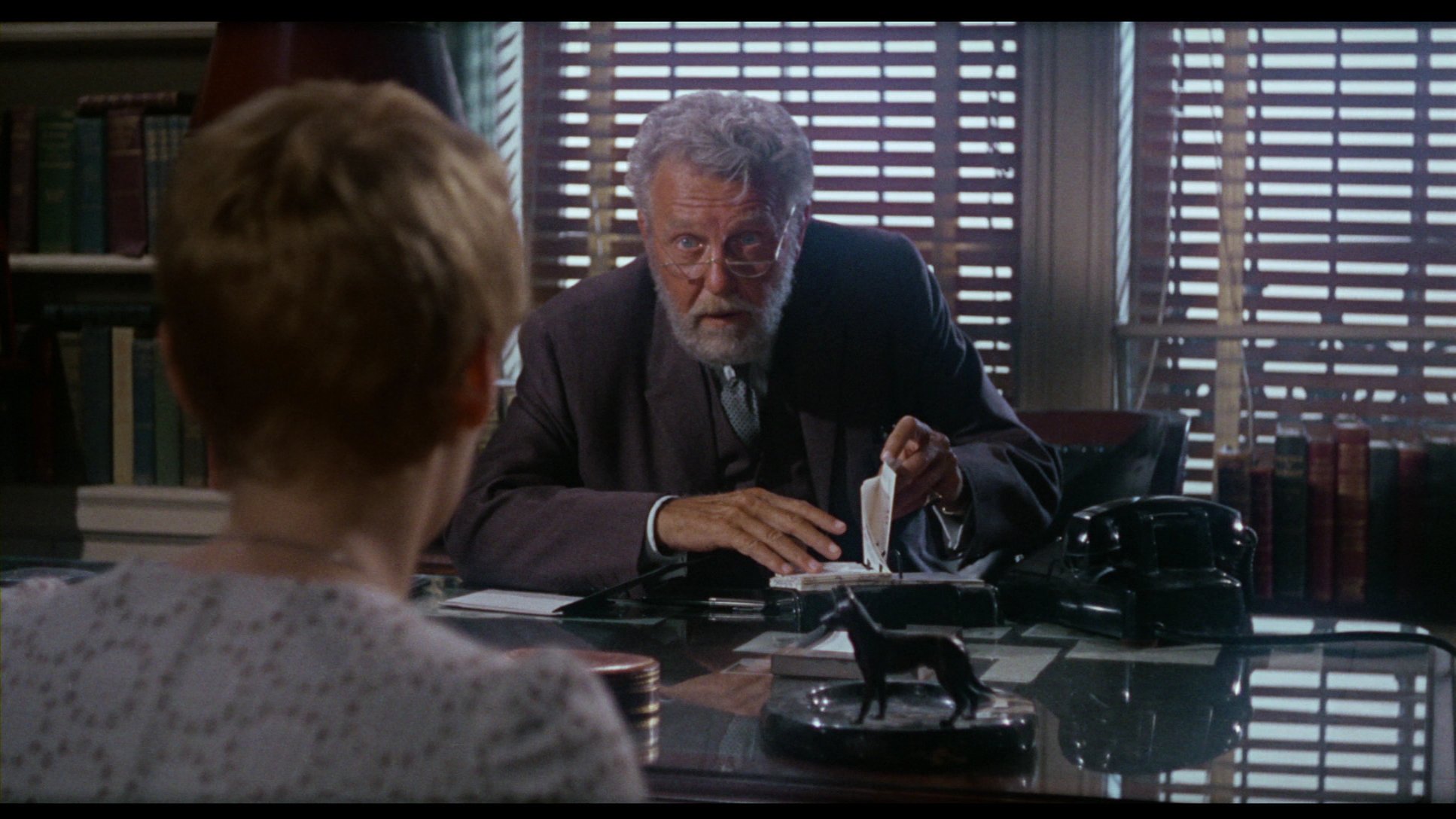
THE TIMING of Rosemary’s conception assures us that her pregnancy will peak at fruition in the last week of June. 06–66. Again, how adorable. After an appointment with her own OB/GYN, Dr. Hill, the elated Castevet’s insist that she go with their very close friend, Dr. Abraham Sapirstein, whom we are assured is a very prominent obstetrician. Of course, he is. Dr. Hill is a nobody. A bland commercial knock-off. Contrarily, the sons of Cain are all prominent.
Sapirstein even plays the part of the Ministry of Truth, as he “fact checks” pregnancy myths by insisting that she take his expert advice and not read any of those other books. Rosemary is furthermore assured that her maternity is different from all the others on the basis that no two pregnancies are alike. Sapirstein, you see, is a respectable man of Science. He’s got diplomas and shit. Probably written up in some medical mag too. Everything else is a conspiracy.
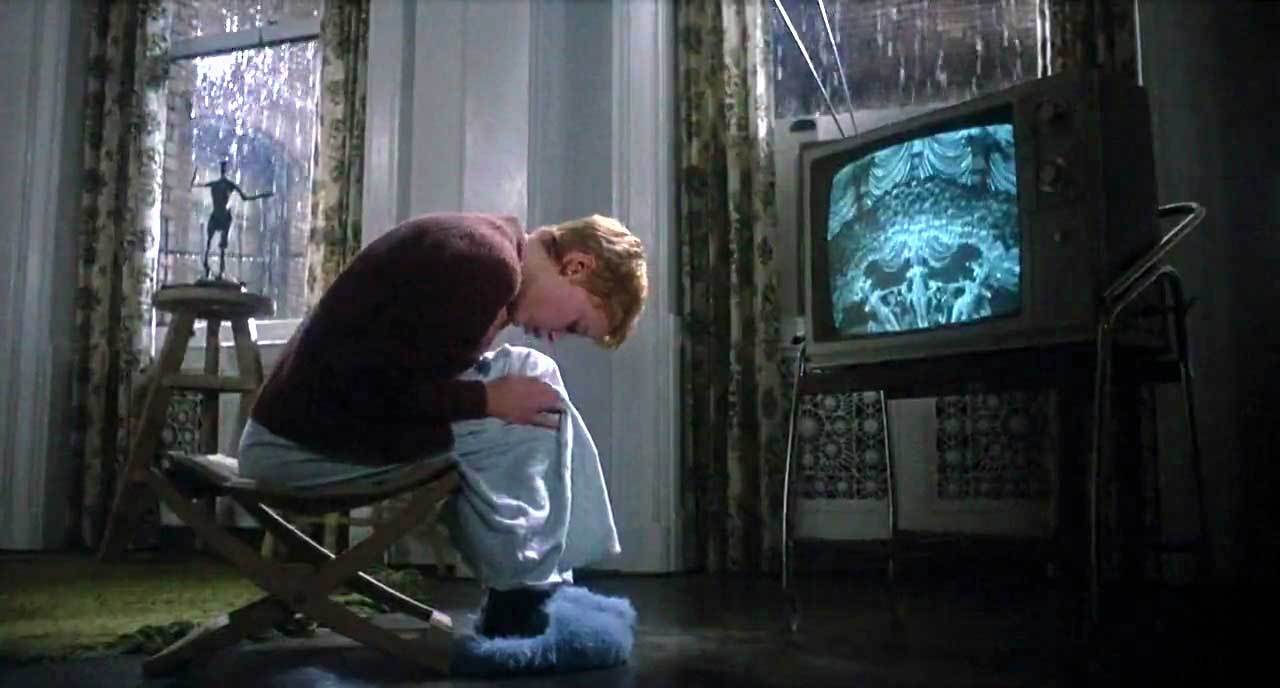
MOST movie commentators advertise Saperstein’s role as being symbolic of patriarchal society, which is true. Certainly, that element exists. By 1968, feminism was on the rise, and Rosemary’s Baby became a conscious springboard to that effect. But even that entire bra burning episode is a Langley creation, aimed at tipping the balance of their own Construct.
The character of Rosemary begins her journey with the gullible innocence of a child, purposed with transforming her goth apartment into a fairy-tale haven. Though Rosemary believes she is in control of her world, it is everyone around her who is ultimately conditioning her for the inevitable. Anyone standing in the way will be removed from the picture. Over the following few months, we see Rosemary in excruciating agony, and we’re not simply talking about morning sickness. She suffers severe abdominal pain while increasingly losing weight, and to an almost dehumanizing degree. Her only advocate comes by way of her old friend Hutch, who is alarmed at her gaunt appearance. But more on Hutch in a moment, because the Patriarchal Society of Rosemary’s world discredits any notion that she should have control of her body, as Saperstein’s subscription of unique pills is purposely mixed with a daily regimen of Tannis root-laced drinks, supplied by the Castevet’s.
Rosemary does attempt to declare her own independence at one point or another. Her cutting of hair is a rebellious act and a cry for help which will never be commented favorably upon.
Guy takes one look at her new look and asks: “What’s that?
“It’s Vidal Sassoon,” she quips.
Funny—because Vidal Sassoon actually cut her hair for the movie. Also, because Polanski knew or thing or two about including hair stylists in an Intel psyop, as Jay Sebring was a hairstylist murdered by another hairdresser, Tex Watson.
Guy responds: “Don’t tell me you paid for that.”
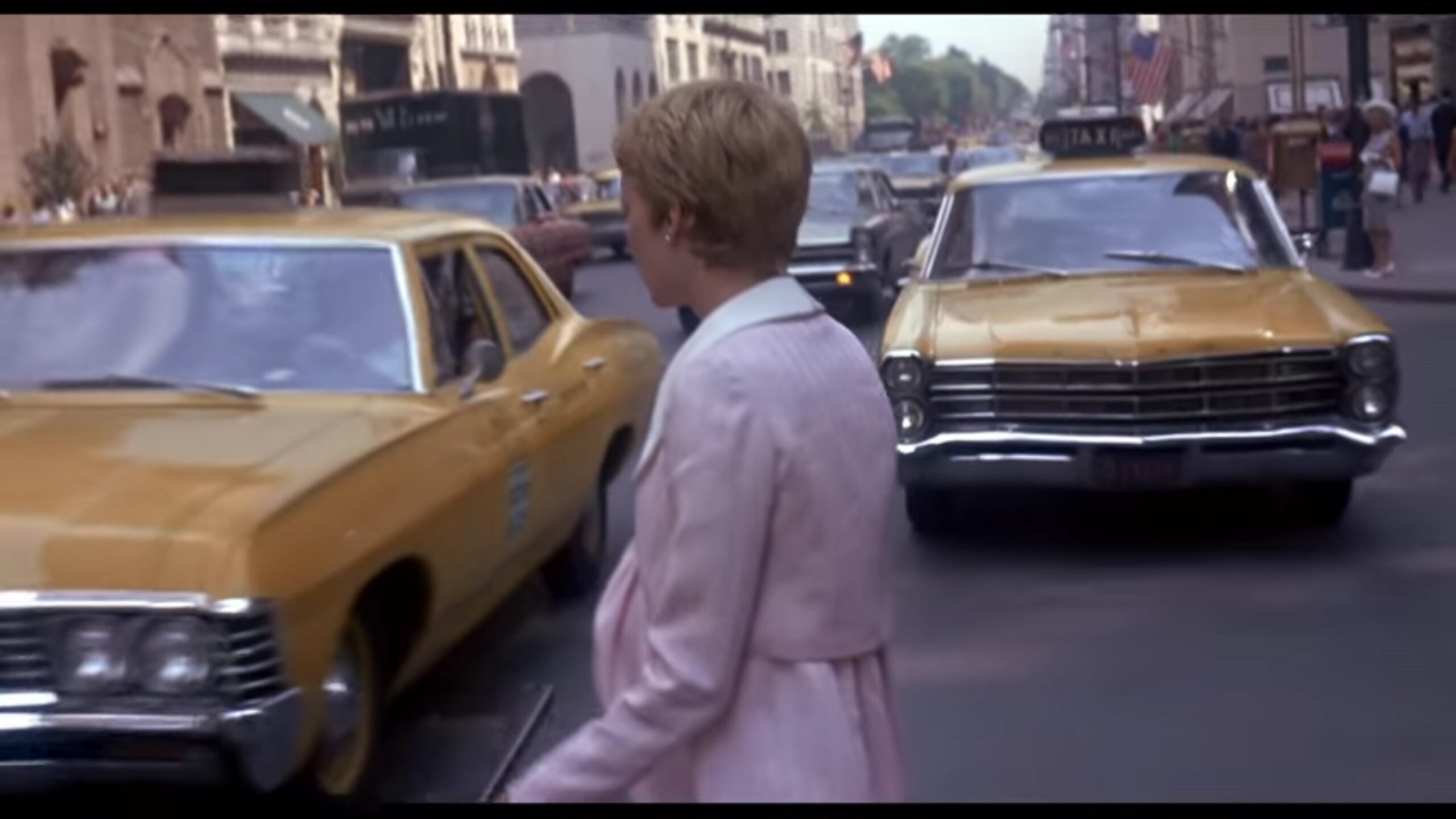
THE HANDWRITTEN note concerning Mrs. Gardenia’s disassociation from the self can now be said true of Rosemary. Pregnancy cravings encourage an eating of raw meat, like some kind of animal. While braving midtown Manhattan, hoping for a secret meeting with Hutch, Minnie Castevet happens upon her. She claims to be Christmas shopping but that much is an obvious lie, as the nosy neighbor has craftily remained in her shadow until now—always playing the part of the Controller. Eventually, Rosemary haphazardly wanders across the busy avenue, paying no mind whatsoever to the onslaught of taxis. Her conditioning is almost complete.
There is only one obtrusive outside obstacle, and that is her old friend. Hutch has been sticking his nose where it doesn’t belong, researching the troubled history of Bramford. Minnie Castevet of course intercepts their meeting, and before Hutch can ultimately share his findings with Rosemary, he succumbs to a mysterious coma—just like Mrs. Gardenia.
After Rosemary’s friends encourage her to take control of her body again (at a party thrown by Rosemary in yet another obtrusive act of independence) even going so far as to forcibly remove her husband from the kitchen while they engage in girl talk, Guy calls them bitches. Unable to withstand the pain any longer, Rosemary insists on seeing Dr. Hill. Guy argues against it, insisting, just as he had with the Castevet’s chocolate mousse, that Dr. Sapirstein will be offended. As they argue, the entity within her seemingly wakes to consciousness. For the first time in months, the pain suddenly stops and Rosemary feels the baby move.
Crisis diverted.
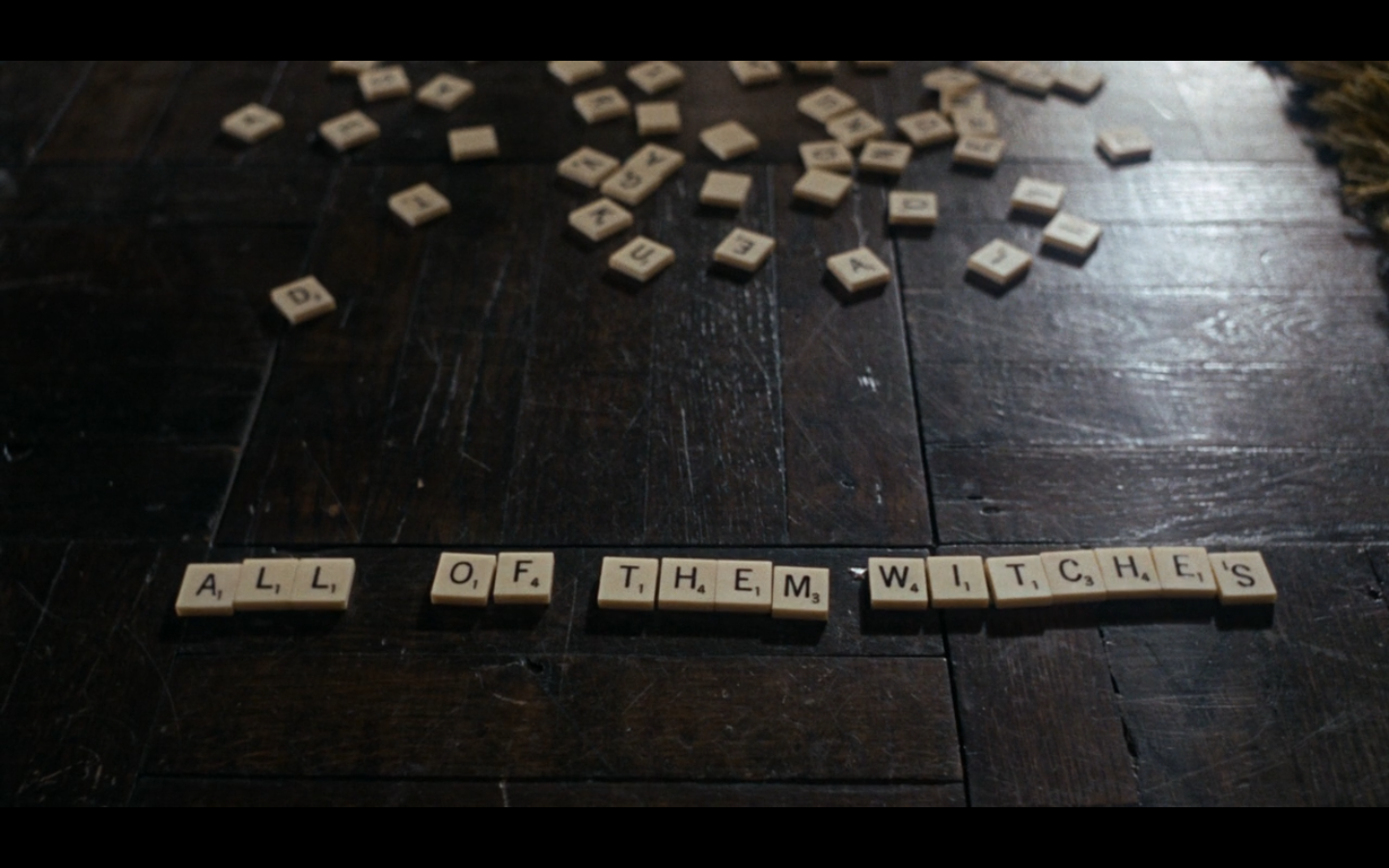
THAT is, until Hutch’s funeral.
The final hiccup to the conspirators’ plan arrives with Hutch’s post mortem warning. At his funeral, a woman named Grace Cardiff, who is identified as Hutch’s daughter, delivers a book into Rosemary’s hands. Its title reads: All of Them Witches. Apparently, Hutch had come out of his coma just long enough to give his final wishes and tell the doctor that the book was intended for Rosemary as an anagram.
“The name of the book?” Rosemary asks.
“Apparently,” Grace shrugs.
Back at her Bramford apartment, Rosemary pours through its pages and learns more about this Adrian Marcato individual, whom Hutch had earlier attempted to warn her about. Born in 1846. Devoted to Satanism. Called forth Satan in 1896, and at their very Bramford building too. Got it. She then dumps her Scrabble bag onto the floor and gets to work rearranging its pieces. From the book title she is able to decode the following messages: COMES WITH THE FALL as well as ELF, SHOT, CAME, WITCH. The big revelation however comes with the name ADRAN MARCATO. It also spells out ROMAN CASTEVET.
Roman Castevet is the son of Satanist Adrian Marcato.
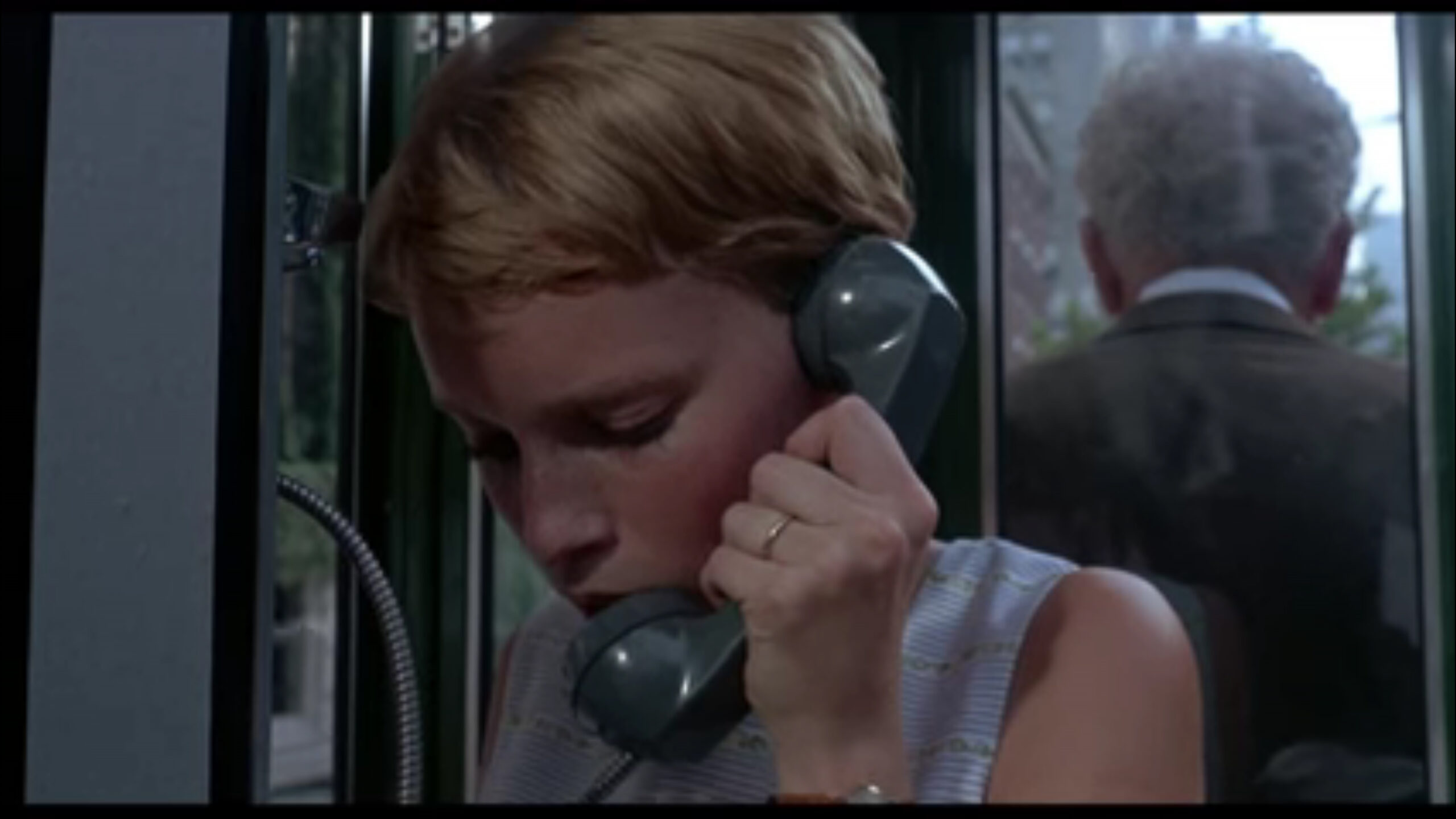
AFTER Guy learns of her little research project, the now successful actor discounts her suspicions and promptly throws away the book. He justifies his actions in that he doesn’t want to further upset her pregnancy, even commenting upon the fact that her hands are shaking. His total disregard for her own intuition however finally fills in the missing pieces, as she is now convinced that her own husband is conspiring with them.
Terrified, and with seemingly no one left to turn to, Rosemary flees to a nearby phone booth, hoping to nab Dr. Hill’s attention.
“All of them. All of them. All of them in it together. All of them. All of them witches,” Rosemary repeats to herself while waiting upon Hill’s office to return her call. She then speaks to her unborn child: “Don’t worry, little Andy or Jenny, I’ll kill them before I let them touch you.”
When Dr. Hill finally calls, Rosemary accelerates full speed into her wild rants and ravings, just as anyone might who has only recently discovered the paper-thin reality of the world around them. “I can’t stay too long here. They’ll be coming, looking for me. Dr Hill? Dr Hill, there’s a plot… I know that sounds crazy. You’re probably thinking, ‘This girl has flipped,’ but I haven’t flipped, Dr Hill, I swear, by all the saints. There are plots against people, aren’t there?”
The voice on the other end seems to shrug.
“I suppose there are.”
“There’s one against me and my baby,” Rosemary insists.
“Come see me tomorrow after five,” Hill says.
Rosemary fears she’ll never survive that long.
“Now! Right now.”
A strange old man hovers outside the phone booth smoking a stogy. Rosemary does not notice him until after she hangs up the phone. How long has he been standing there listening in? She can’t be certain. Is he Intel? Probably. They’re always listening. Watching. Smiling and waving—just to screw with your head.
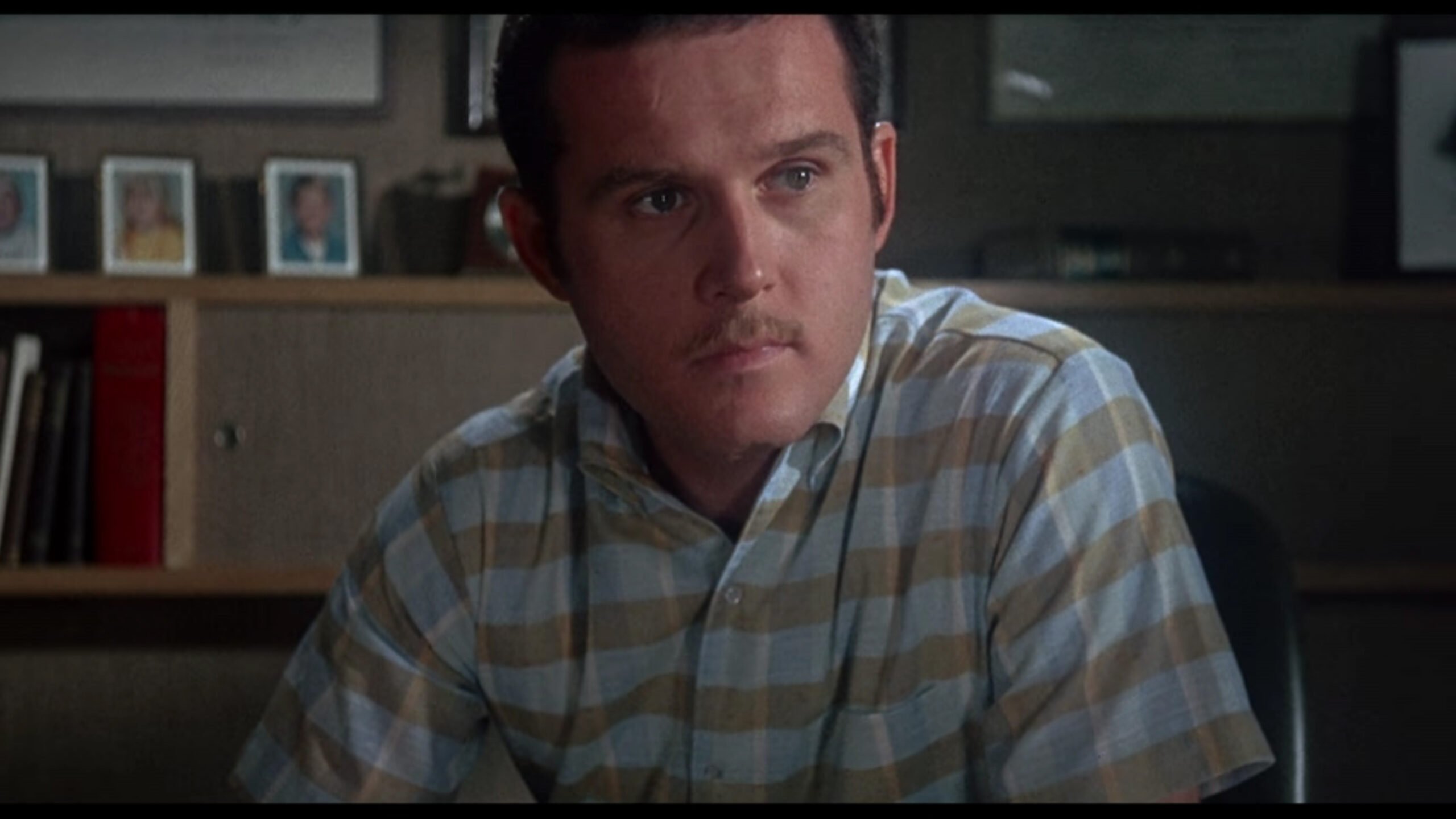
IN Dr. Hill’s office, Rosemary’s rants and ravings continue at a queasy pace. Unless that is you’re a veteran conspiracy theorist and know how to keep up.
“He lied to you. He said we were going to Hollywood. The worst thing of all, he’s involved with them as well. He sleeps in pajamas now. He never used to before. He’s probably hiding a mark. You know they give you marks when you join. All sorts of rituals. They hold Sabbaths there. You could hear them singing through the walls…. Um, they’re very clever people. They planned everything right from the beginning. They probably made some sort of deal with Guy. They gave him success, and he promised them our baby to use in their rituals. I know this sounds crazy, but I’ve—I’ve got books here. Look.”
Rosemary then describes the terrible pain she was in, the drink spiked with tannis root (the witches book called it Devil’s Pepper), and how her husband Guy had a part to play in the comma which the coven of witches forced upon him by stealing one of his gloves and putting a curse upon it. Finally concluding, she says: “Maybe all this is coincidence, but one thing is for sure, they have a coven and want my baby.”
Dr. Hill cautiously replies: “Certainly seems that way.”
What way—the part where she said the coven wanted her baby or that all of this may have been a coincidence? We are not told. Dr. Hill is the everyday man when presented with conspiracy. He is neither conspirator nor theorist. He can therefore choose to believe the conspiracy, as delivered by the theorist, or the seemingly more pragmatic approach of its fact checking conspirators, the later of whom openly promote the very paradigm which he wishes to inhabit.
Rosemary smiles with delirious relief: “I was afraid you wouldn’t believe me.”
“I don’t believe in witchcraft,” Dr. Hill insists, “but there are plenty of maniacs and crazy people in this city.”
Seems like a practical compromise. Honor the woman’s belief system, even if he doesn’t adhere to it. He then asks for the doctor’s name.
The doctor’s name is Sapirstein, she says.
Dr. Hill looks up, somewhat jostled. “Abraham Sapirstein?”
“Yeah. Do you know him?”
“I’ve met him once or twice.”
“To look at him you wouldn’t think…”
“No, you wouldn’t. Not in a million years.”
Hill certainly tries to listen in upon the needs of his patient, but what happens when the theory becomes impractical to the globular Construct he wishes to inhabit? He chooses to hand over the conspiracy theorist to the conspirator. In this way, and no matter how much he convinces himself the he’s far too sophisticated to believe in something so primal as witchcraft, he benefits from the effects of the spell. While Rosemary sleeps on the examination table, Hill makes a few phone calls. She awakes to find Dr. Sapirstein and Guy entering the room with Hill. The common man has offered her up as a sacrifice in order that he might remain in the illusion.
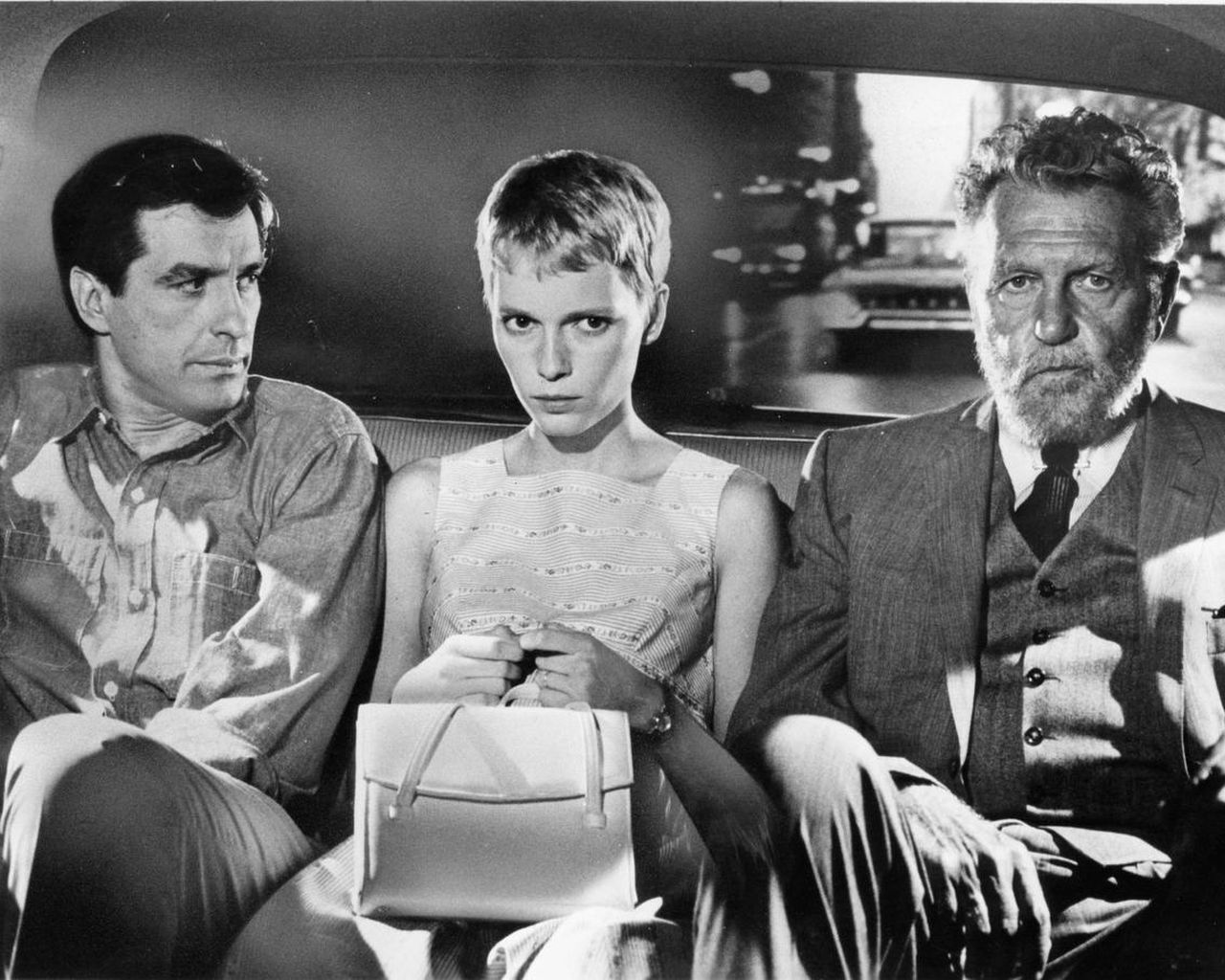
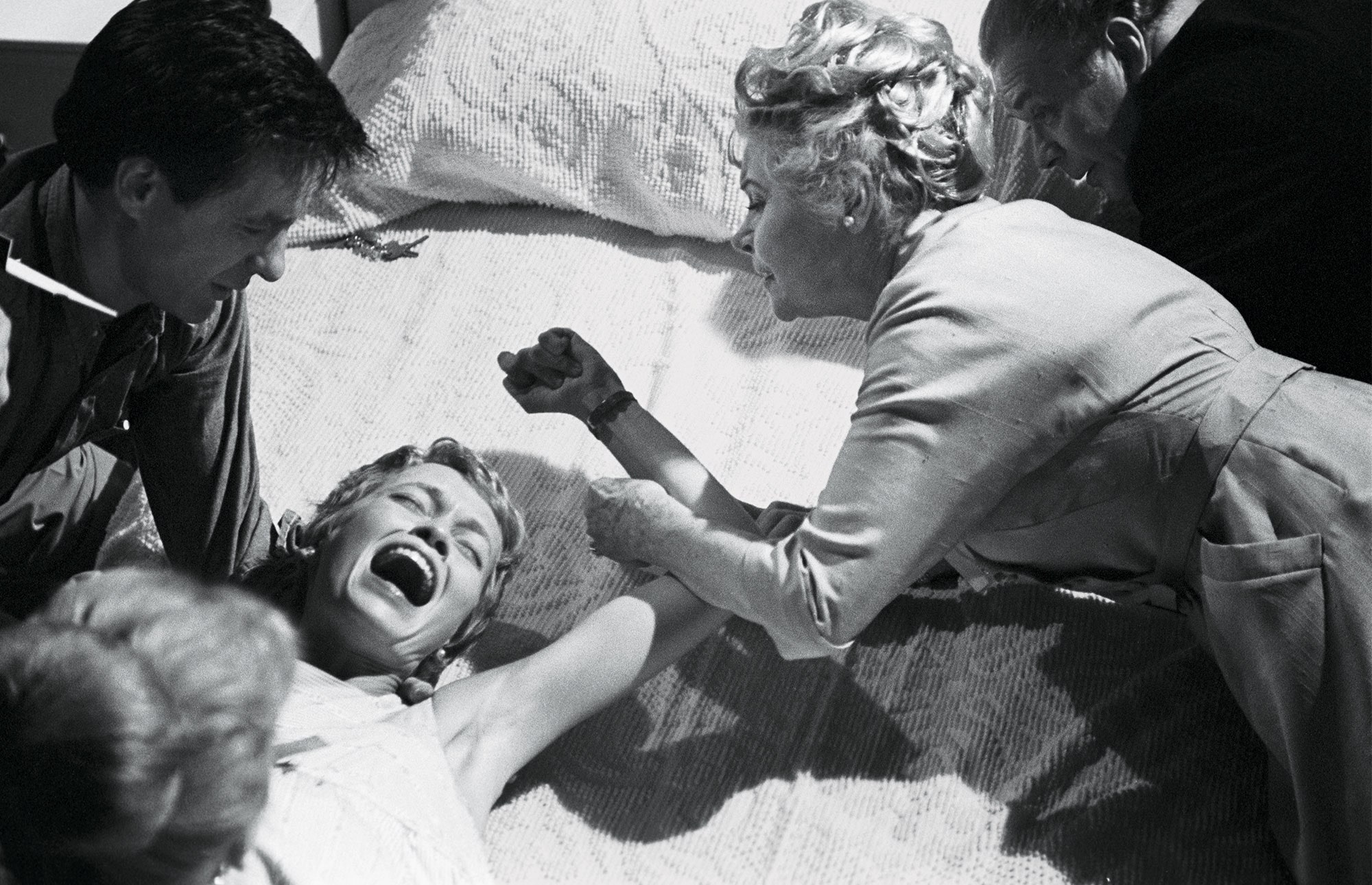
BACK at the Bramford, the coven gives Rosemary a “mild sedative” to calm her down. The Government likes it like that. A daily dosage of blue pills goes a long way.
The true horror offered to us is of the psychological nature. It is only now in the movie when we finally and fully realize that Rosemary is not in control of her own body. She never has been. For the drug they feed her, you see, was not simply poisonous to her health; it held magical components intended to out-muscle her mind. Despite her desire to keep those nosy neighbors out of her apartment, their watchful eye was nearly omnipresent, even preordained from the very beginning. In the intervening months, she was denied information and furthermore mocked at every turn, simply for desiring to research and read the sort of truth which might be found in dusty old books and help to inform her own decision.
After Terry jumped from the window, Rosemary still chose to wear the necklace, even though doing so challenged her own instincts. Today people take The Government enforced VAX and hate it, but they roll up their sleeve anyways, partly out of fear and for a so-called love of the greater good, but mostly because the Intel community has convinced them it was their own idea—as well as the loving thing to do—all along.
Anyhow, they hold her down and deliver medicine, that Rosemary might be a good little girl. She also goes into labor.
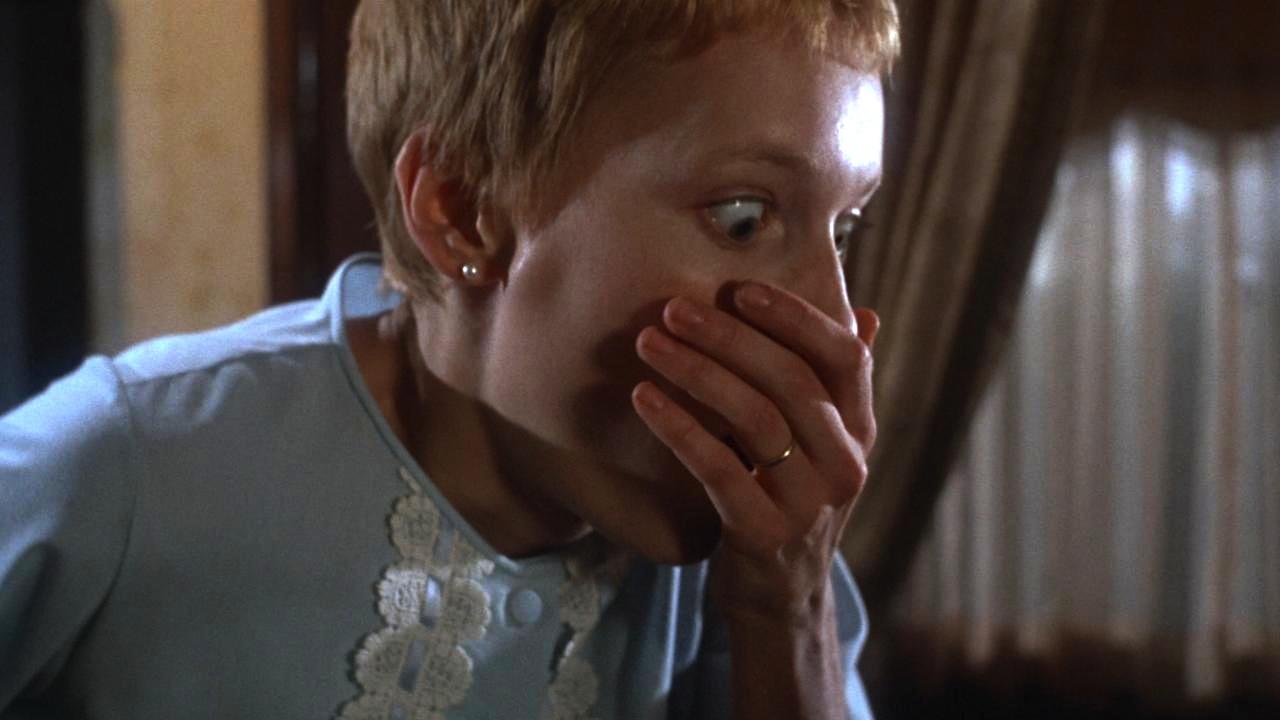
WHEN next she awakens, the baby is reported dead, and Guy is already speaking of their new life with Paramount studios and Universal and all that, living in some big fancy mansion in Beverly Hills complete with a swimming pool. So, you’re saying this is a biography on acting? Apparently. Rosemary however is convinced that her baby is alive, particularly since members of the Castevet’s entourage are going out of their way to pump her breastmilk and keep it sterile. There’s also the matter of a baby’s cry which only she admits to hearing.
Recalling the linen closet, which Mrs. Gardenia had pushed a cabinet in front of, Rosemary discovers a hidden door leading into Roman and Minnie Castevet’s apartment. It is there—under the dominant portrait of Adrian Marcato—where she interrupts her husband with numerous coven members, congregating around a bassinet draped in black. Dr. Saperstein arrives, as does some sort of foreign dignitary. Probably a member of the United Nations. Because everyone who’s anyone is in on it.
Peering inside, a horrified Rosemary demands to know what is wrong with her baby’s eyes.
Roman Castevet proudly declares: “He has his father’s eyes.”
The entire room erupts with cries of “Hail Satan!” while simultaneously quoting from Nietzsche and spook literature like TIME Magazine. You know, God is dead and all that. His name is Adrian, by the way. Roman encourages Rosemary to mother her son, and here she has an important decision to make. Will she leave or will she stay? She knows too much, obviously. If she leaves, she dies. If she stays, she prolongs her life only so much that she dies a slow death. Guy attempts to calm her, promising a slice of the pie and a child of their own, to which she spits in his face. So, she chooses to leave then? Not quite. And that is because Rosemary has been conditioned by everyone. After hearing the infant’s cries, Rosemary chooses her fate and gently rocks the cradle. Deal with the Lake of Fire another day then.
Rosemary’s Baby is a Masterful horror film, particularly because of its accuracy. The Secret Societies who run our world see every one of us as a Rosemary. Her disassociation is intended for all of humanity. Our reality is an illusion—the result of interwoven spells—and should we choose to accept or go along with the agenda, as Rosemary has, our end result is becoming transformed into a certain Beast image. In this manner, even Dr. Hill will experience the same fate. Satan isn’t simply seeking for one solitary son of Cain to rule the world. He wants his seed in everyone. You want Satanism?
There’s your Satanism.
Noel
